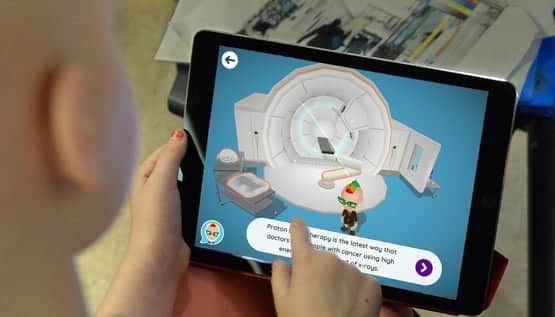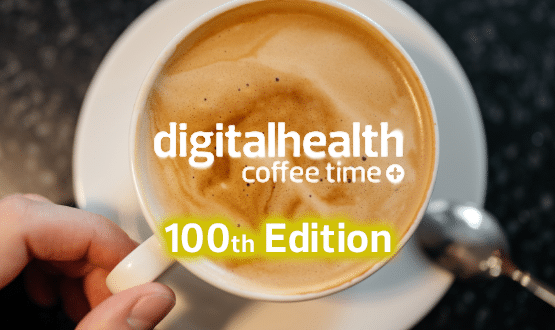How a daughter’s cancer treatment inspired an interactive app for sick kids

After watching his 13-year-old daughter go through a gruelling year of cancer treatment Dom Raban realised more could be done to help children feel at ease in hospital.
Now his app, Xploro, has been trialled at The Christie NHS Foundation Trust and Royal Manchester Children’s Hospital, with further plans to expand it across the NHS.
The app provides an interactive experience for young patients receiving hospital treatment, allowing them to interact with a personally designed avatar that can explain treatments, machines that will be used and answer any questions they have about their hospital stay.
With more than 10 years experience as the managing director of an interactive design company, Raban set about looking at digital solutions that would provide important information about care and treatment to young patients.
His daughter, Issy, was diagnosed with Ewing’s sarcoma in 2011. It was during her treatment that Raban realised there was tools for young children, like colouring books, but there was a gap in the market for older children and adolescents.
“She went through a horrendous year of treatment that involved all sorts of technologies, six different hospitals, 15 rounds of chemo, God knows how many blood transfusions,” he told Digital Health.
“Part of the reason she is fit and well now is because she had amazing clinical care, but what was lacking on that journey was information about the environment she was going to be treated in, or the technologies and processes that were going to be used, or the people she was going to meet.
“A good example of that is, one day she was at a hospital and someone rolled over a machine and started plugging it in and no one told her, or us, what it was. It was a stem cell harvester and that process failed because she wasn’t prepared for the experience.”
Add on top of that the different hospital environments in each new visit, new clinicians in different uniforms every time she had a new treatment and not knowing what the treatment was going to entail, it makes for an utterly overwhelming experience.
Raban became interested in information as a therapy, reflecting on how it could have helped Issy, who is now at university.
He decided he wanted to deliver health information in a way that it wasn’t at the time – in a way that was accessible to children.
“I knew that for us to have any success with Xploro it needed to be more than just based on a hunch that information was important,” he added.
“I started doing lots of research and looking for research that supported the value of information. I discovered loads of research and it all said to provide patients with information prior to an intervention and that will reduce stress, reduce anxiety and that can lead to better clinical outcomes.”
Four years ago he began working on the prototype for Xploro.
Now it’s a finished product ready to go into hospitals, with an expert panel of 10 to 16-year-olds advising the designers.
How does the app work?
There are three components to the app: a children’s app, a management portal and a parent app.
The children’s app delivers everything through an augmented-reality character that the child creates and names themselves.
It becomes their virtual friend, and leads them through every part of the app.
“They can view their avatar in augmented reality, so it makes it feel a bit Pokemon Go-like. They can also view avatars as each of the staff roles they’re likely to encounter and can customise those so they resemble their own medical staff,” Raban said.
“Then there’s 3D augmented reality models of things like MRI scanners, hospital wards and operating theatres.
“There’s also a series of games, some of which are multiplayer, so children on the ward can play with and against each other. Each of the games deals with a different aspect of treatment, for example there’s a game called Plasma Patrol which is all about how leukaemia is treated.”
To make hospital processes even easier to understand, the avatar is also an artificial intelligence chatbot, which has been trained to understand how a child might speak in order to better understand how they might talk.
For example, if a child asks “What’s chemotherapy?” but doesn’t spell chemotherapy correctly, the chatbot is able to derive what they mean.
Clinicians are able to track a patient’s mood using the app, which asks children to rate their mood and experience of different treatments, in order to improve their care.
Parents can log on to provide parental permission before the child uses the app, and also to view information about the apps clinical backing.
Xploro was one of two companies to be granted €50,000 (£45,300) in the European Institute of Technology’s (EIT) Health Headstart Awards.
The awards are designed to help innovative health tech businesses overcome short term hurdles and strengthen their business profile.
Xploro was also shortlisted in this years AXA Health Tech & You Awards.
Now in its fifth year and led by AXA PPP healthcare, the awards recognise those companies which are using technology to improve the health and well-being of people.
This year’s awards were launched in November and the categories were; Sleep Tech Challenge, Mental Health in Children Challenge, Mobility and Accessibility Challenge, Innovation in Health Tech and Excellence in Health Tech.



